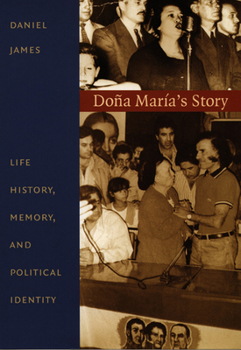Doña María's Story: Life History, Memory, and Political Identity
Select Format
Select Condition 
Book Overview
In this remarkable book historian Daniel James presents the gripping, poignant life-story of Do a Mar a Rold n, a woman who lived and worked for six decades in the meatpacking community of Berisso, Argentina. A union activist and fervent supporter of Juan and Eva Per n, Do a Mar a's evocative testimony prompts James to analyze the promise and problematic nature of using oral sources for historical research. The book thus becomes both fascinating narrative...
Format:Paperback
Language:English
ISBN:082232492X
ISBN13:9780822324928
Release Date:January 2001
Publisher:Duke University Press
Length:336 Pages
Weight:1.20 lbs.
Dimensions:0.9" x 6.1" x 9.1"
Customer Reviews
1 rating
The voice of a "descamisada"
Published by Thriftbooks.com User , 21 years ago
In the famous musical EVITA, Eva Peron sings to her followers, the "descamisados" (Spanish for "the shirtless ones"). Dona Maria, the subject of DONA MARIA'S STORY, was a real life descamisada. She was a follower of Juan and Eva Peron. Therefore, I believe this is an important book because this is the first time an account of someone who was actually there - someone favorable to the Perons - has been the subject of a widely available book in the United States. As Dona Maria points out, very rarely do we in the United States hear anything positive about the Perons, especially where Evita is concerned. DONA MARIA'S STORY is not always an easy read, however. That is due in part to the fact that it is mostly based on the author's interviews with Dona Maria, which were conducted in Spanish and then translated into English. As is almost always the case, some things are lost in the translation (Dona Maria refers to Evita's bravery and humanity, commenting that she was not afraid to visit the very poor in the slums "where everything was full of puss"). But what does come through vibrantly is the tight-knit working class community of Barisso that Dona Maria spent most of her life in, as well as the intense emotions that the "descamisados" had - and still have - for Juan and Eva Peron. The author mentions attending political rallies and seeing images of the Perons everywhere, and being both moved and a little frightened by the intensity of the emotion aroused. The bittersweet aspect to the story is that the memory of the Perons, and therefore the rhetorical sweep of Peronism, is largely being relegated to the realm of nastalgia, being compressed into a mythic golden age (rather than having evolved into a present objective reality). The danger in this is that the younger generations are not as enthralled because they didn't experience the Perons firsthand. The author reasons that it was the job of the monuments to the Perons that stand in the town square to pass on the legacy of Peronist magic, but it may not be working. The younger generation of Argentines are perhaps as familiar with Madonna's version of "Evita" as they are with the real historical woman who at one time was the most powerful woman in their country and all of Latin America.I was very moved by DONA MARIA'S STORY.




